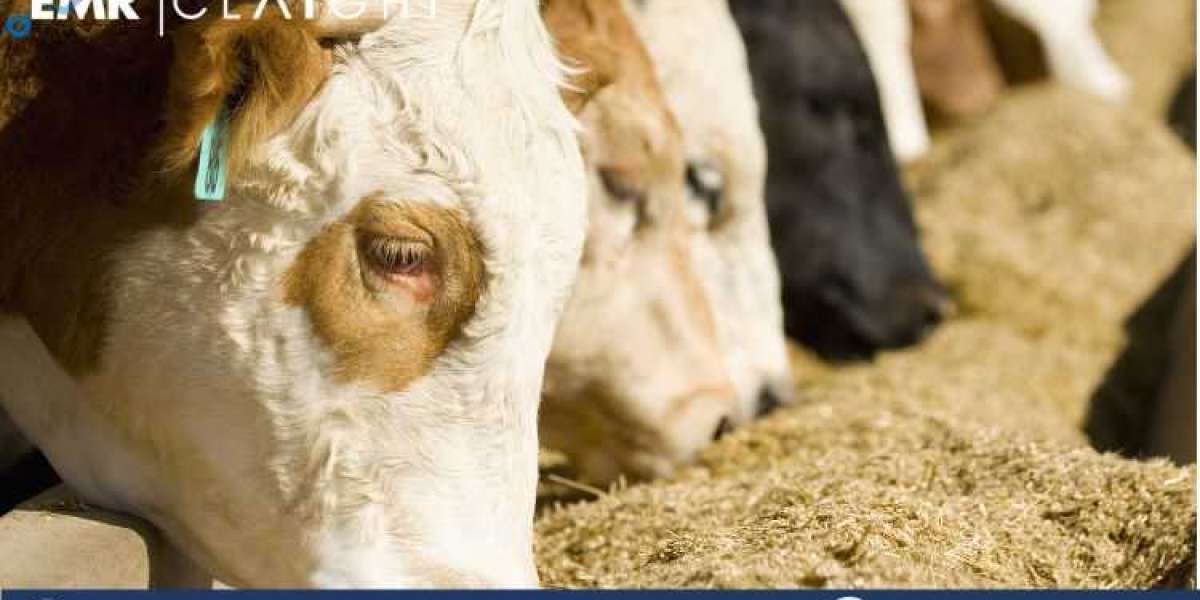The global probiotics in animal feed market size is expected to grow at a CAGR of 5.9% during the period 2024-2032. In recent years, the integration of probiotics into animal feed has garnered significant attention within the agricultural industry. Probiotics, often referred to as "beneficial bacteria," offer a range of benefits for animals, including improved digestion, enhanced immunity, and optimized performance. In this blog post, we will delve into the fascinating world of probiotics in animal feed, exploring their impact on animal health and performance across various sectors of livestock farming.
Understanding Probiotics
Probiotics are live microorganisms that confer health benefits when consumed in adequate amounts. In animal nutrition, probiotics play a crucial role in maintaining gut health and overall well-being. These microorganisms work by colonizing the gastrointestinal tract, where they modulate the composition of gut microbiota and support digestive processes. Common probiotic strains used in animal feed include Lactobacillus, Bifidobacterium, and Bacillus species, each offering distinct benefits for animal health.
Probiotics exert their effects through multiple mechanisms. They compete with harmful bacteria for space and resources, thereby reducing the colonization of pathogens in the gut. Additionally, probiotics produce metabolites such as short-chain fatty acids and antimicrobial peptides, which help maintain the integrity of the intestinal barrier and inhibit the growth of harmful microorganisms. Furthermore, probiotics stimulate the production of mucin and immunoglobulins, which enhance the gut's protective mechanisms and support immune function.
Impact on Animal Health
One of the primary benefits of probiotics in animal feed is their ability to improve gut health. By promoting a balanced gut microbiota and enhancing nutrient absorption, probiotics contribute to better digestion and overall gastrointestinal function in animals. The gut microbiota plays a crucial role in nutrient metabolism and immune regulation, and disruptions in its composition can lead to various digestive disorders and immune-related conditions.
Probiotics help restore and maintain the balance of gut microbiota, which is essential for optimal health and performance in animals. Studies have shown that probiotic supplementation can improve the diversity and stability of gut microbial communities, leading to enhanced nutrient utilization and immune function. As a result, animals supplemented with probiotics exhibit lower rates of digestive disorders, such as diarrhea and bloating, and demonstrate improved overall health and well-being.
In addition to promoting gut health, probiotics exert immunomodulatory effects, bolstering the immune system and reducing the incidence of diseases. Probiotic microorganisms interact with the gut-associated lymphoid tissue (GALT), which is a vital component of the immune system, and stimulate the production of cytokines and antibodies. This immune-stimulating effect helps animals resist infections and mount a more robust immune response against pathogens.
Influence on Animal Performance
In addition to promoting health, probiotics have a significant impact on animal performance. Across various livestock sectors, including poultry, swine, and dairy farming, probiotic supplementation has been shown to enhance growth rates, improve feed conversion efficiency, and optimize reproductive performance. The gut microbiota plays a crucial role in nutrient metabolism and absorption, and disturbances in its composition can affect nutrient utilization and growth performance in animals.
Probiotics enhance the digestion and absorption of nutrients, leading to improved feed efficiency and growth performance in animals. By promoting a balanced gut microbiota, probiotics help break down complex carbohydrates and proteins into simpler forms that are more readily absorbed by the host. This improved nutrient utilization results in higher growth rates and better feed conversion ratios, ultimately leading to increased profitability for farmers.
Furthermore, probiotics support reproductive performance in animals by promoting overall health and well-being. Reproduction is a demanding process that requires optimal nutrition and physiological function, and disturbances in gut health can negatively impact reproductive performance. Probiotics help maintain the health of the reproductive tract and support hormone balance, leading to improved fertility and reproductive outcomes in animals. Additionally, probiotic supplementation during gestation and lactation can enhance the health and vitality of offspring, contributing to the long-term sustainability of livestock production systems.
Applications in Different Livestock Sectors
The application of probiotics in animal feed is widespread across different sectors of livestock farming. In poultry farming, probiotics are commonly used to enhance gut health, improve feed efficiency, and mitigate the negative effects of stressors such as heat and overcrowding. Poultry are highly susceptible to digestive disorders, such as necrotic enteritis and coccidiosis, which can significantly impact performance and profitability. Probiotics help maintain the balance of gut microbiota and support digestive health, reducing the incidence of these diseases and improving overall performance in poultry.
Similarly, in swine production, probiotics play a vital role in reducing the reliance on antibiotics and promoting gut health in piglets, leading to improved growth performance and disease resistance. Swine are highly susceptible to gastrointestinal disorders, such as post-weaning diarrhea and porcine reproductive and respiratory syndrome (PRRS), which can result in significant economic losses for producers. Probiotics help stabilize the gut microbiota and enhance immune function, reducing the incidence and severity of these diseases and improving overall performance in swine.
In dairy cattle, probiotics are utilized to optimize rumen function, increase milk production, and support reproductive health. Dairy cows are high-producing animals with demanding nutritional requirements, and disruptions in rumen function can negatively impact milk production and reproductive performance. Probiotics help maintain a stable rumen environment and support the growth of beneficial microbes, leading to improved nutrient utilization and milk production in dairy cattle. Additionally, probiotic supplementation during the transition period and early lactation can reduce the incidence of metabolic disorders and improve reproductive outcomes in dairy cows.
Challenges and Considerations
While the benefits of probiotics in animal feed are well-established, several challenges and considerations must be addressed. Ensuring the viability and stability of probiotic strains in feed formulations is essential to maximize their efficacy. Probiotic microorganisms are sensitive to environmental factors such as temperature, moisture, and pH, which can affect their survival and effectiveness in the gastrointestinal tract. Formulating feed products with appropriate carriers and encapsulation technologies can help protect probiotic strains from degradation and ensure their viability throughout the manufacturing and storage process.
Additionally, regulatory requirements and compliance standards must be met to ensure the safety and effectiveness of probiotic products. Probiotics are considered feed additives in many jurisdictions and are subject to regulatory oversight by government agencies such as the Food and Drug Administration (FDA) in the United States and the European Food Safety Authority (EFSA) in the European Union. Manufacturers must adhere to strict quality control measures and provide scientific evidence to support the safety and efficacy of probiotic products for use in animal feed.
Cost-effectiveness and return on investment are also critical factors for farmers considering probiotic supplementation in animal feed. While probiotics offer numerous benefits for animal health and performance, they represent an additional cost for producers that must be weighed against potential benefits. Factors such as the cost of probiotic products, the magnitude of expected improvements in performance, and the overall profitability of the operation must be taken into account when evaluating the economic feasibility of probiotic supplementation in animal feed.
Future Directions and Innovations
Looking ahead, ongoing research and innovation in probiotics hold promise for further advancements in animal nutrition. Scientists are exploring novel probiotic strains and formulations tailored to specific animal species and production systems. Advances in microbial genomics and metagenomics have enabled researchers to identify and characterize beneficial microbes with unique properties and functions, paving the way for the development of next-generation probiotic products.
Furthermore, the integration of probiotics with other feed additives, such as prebiotics and enzymes, offers synergistic benefits for animal health and performance. Prebiotics are non-digestible carbohydrates that selectively stimulate the growth and activity of beneficial bacteria in the gut, enhancing the effectiveness of probiotics. Enzymes are biological catalysts that help break down complex nutrients into simpler forms that are more readily absorbed by the host, complementing the digestive functions of probiotics. By combining probiotics with prebiotics and enzymes, researchers can develop multifunctional feed additives that target multiple aspects of animal nutrition and health.
The future of probiotics in animal feed is characterized by continued innovation and collaboration across the agricultural industry. As consumer demand for sustainably produced and antibiotic-free animal products continues to grow, probiotics offer a natural and effective solution for promoting animal health and welfare while reducing the reliance on antimicrobial agents. By embracing probiotic supplementation in animal feed, farmers can enhance the productivity, profitability, and sustainability of their operations, ensuring a brighter future for the livestock industry.







